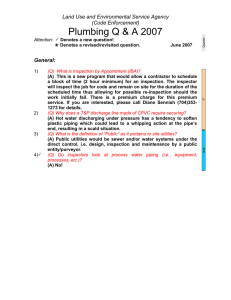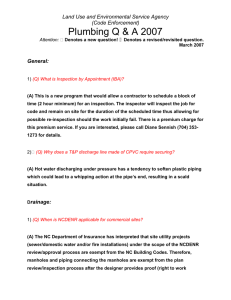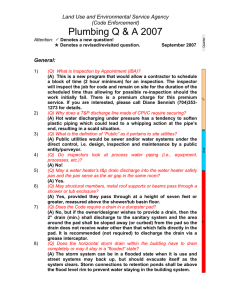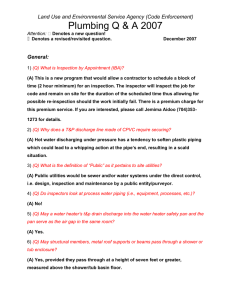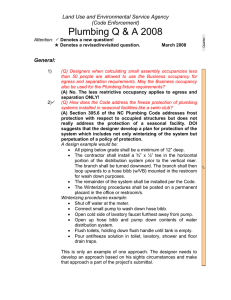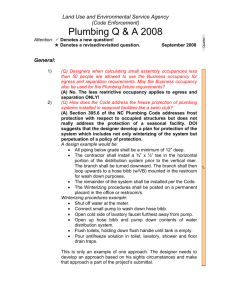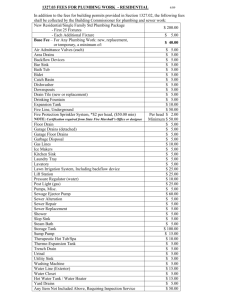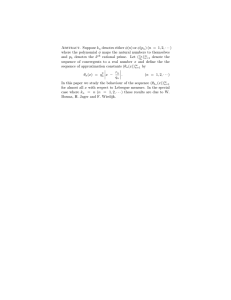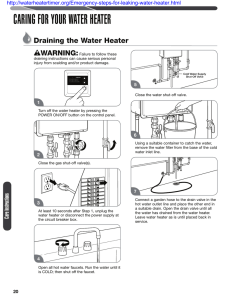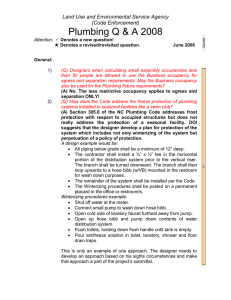Plumbing Q & A 2007 Land Use and Environmental Service Agency General:
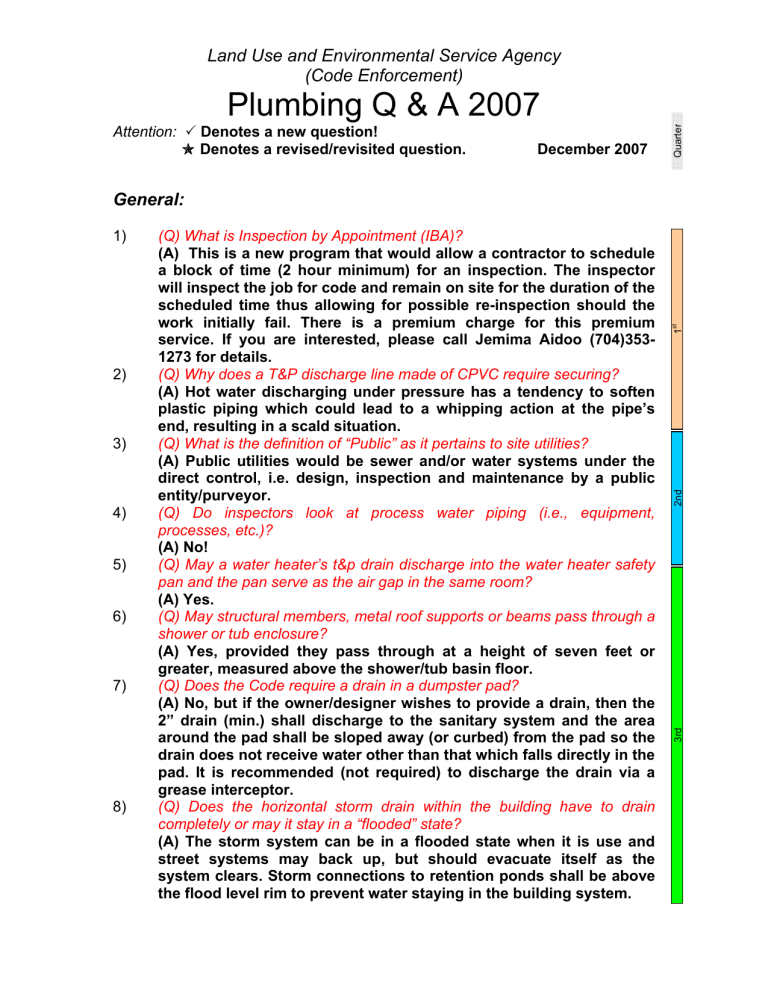
Land Use and Environmental Service Agency
(Code Enforcement)
Plumbing Q & A 2007
Attention: 3 Denotes a new question! z Denotes a revised/revisited question. December 2007
General:
1) (Q) What is Inspection by Appointment (IBA)?
(A) This is a new program that would allow a contractor to schedule a block of time (2 hour minimum) for an inspection. The inspector will inspect the job for code and remain on site for the duration of the scheduled time thus allowing for possible re-inspection should the work initially fail. There is a premium charge for this premium service. If you are interested, please call Jemima Aidoo (704)353-
1273 for details.
2) (Q) Why does a T&P discharge line made of CPVC require securing?
(A) Hot water discharging under pressure has a tendency to soften plastic piping which could lead to a whipping action at the pipe’s end, resulting in a scald situation.
3) (Q) What is the definition of “Public” as it pertains to site utilities?
(A) Public utilities would be sewer and/or water systems under the direct control, i.e. design, inspection and maintenance by a public entity/purveyor.
4) (Q) Do inspectors look at process water piping (i.e., equipment, processes, etc.)?
5) (Q) May a water heater’s t&p drain discharge into the water heater safety pan and the pan serve as the air gap in the same room?
(A) Yes.
6) (Q) May structural members, metal roof supports or beams pass through a shower or tub enclosure?
(A) Yes, provided they pass through at a height of seven feet or greater, measured above the shower/tub basin floor.
7) (Q) Does the Code require a drain in a dumpster pad?
(A) No, but if the owner/designer wishes to provide a drain, then the
2” drain (min.) shall discharge to the sanitary system and the area around the pad shall be sloped away (or curbed) from the pad so the drain does not receive water other than that which falls directly in the pad. It is recommended (not required) to discharge the drain via a grease interceptor.
8) (Q) Does the horizontal storm drain within the building have to drain completely or may it stay in a “flooded” state?
(A) The storm system can be in a flooded state when it is use and street systems may back up, but should evacuate itself as the system clears. Storm connections to retention ponds shall be above the flood level rim to prevent water staying in the building system.
Land Use and Environmental Service Agency
(Code Enforcement)
Plumbing Q & A 2007
Attention: 3 Denotes a new question! z Denotes a revised/revisited question. December 2007
General continued:
9) (Q) May a utility or plumbing contractor use sanitary tees in laterals connecting to NCDENR regulated mains?
(A) No. Laterals shall meet the NC Plumbing Code regulations.
10) (Q) Who is responsible for checking the bollard protection at a water heater?
(A) The mechanical group are the primary personnel for gas water heaters with the plumbing group as backup. The plumbing group are the primary personnel and mechanical are the backup on electric water heaters.
11) (Q) How many bathrooms on a multi bath house must be complete prior to the structure receiving a C/O?
(A) The scope of work covered under the plumbing permit when it was purchased is required to be completed! However, we sometimes allow a minor deviation when an item is on back order. The field inspector makes the call.
12) (Q) Section 605.23 speaks of isolating different materials when the piping is connected to each other. Would a plastic lined nipple be allowed at water heater connections?
(A) Water heater ports are usually coated steel female pipe thread openings. The Code would address these connections as:
1. Coated steel nipple = unacceptable
2. Dielectric female union = acceptable
3. Dielectric male thread union = acceptable
4. Solid brass nipple/coupling = acceptable
Land Use and Environmental Service Agency
(Code Enforcement)
Plumbing Q & A 2007
Attention: 3 Denotes a new question! z Denotes a revised/revisited question. December 2007
General continued:
13) 3 (Q) What should an inspector do when confronted with a deviation from the approved drawings and the deviation would also meet the Code?
(A) The inspector needs to ask him/her self, “Is this a substantial deviation from the approved set of drawings”? This is the inspectors call! If the deviation is substantial, the plans need to be changed to reflect the installed work.
14) 3 (Q) What is considered “adaptable” as it pertains to handicap kitchen sinks in an apartment/condominium?
(A) Changing the height of the countertops is not covered under
“adaptable” in the handicap code. The tops would already have to be
34” to be acceptable. What is covered is the 30” access space under the kitchen sink. To accomplish this the contractor would have the sink base unit fabricated as a separate piece that could be unfastened and replaced with a unit having the required clearances.
15) 3 (Q) Should an inspector fail the inspection of a replacement water heater whose T&P valve is leaking?
(A) Yes and mark the defect with an H0 (defect by others) to disengage the failure.
16) 3 (Q) Do electric water heaters have to be placed on a stand?
(A) Yes, water heaters installed in a garage have to be elevated so that their ignition sources are a minimum of 18” above the floor.
17) 3 (Q) Do water softeners require an expansion tank?
(A) Expansion devices on residences are ONLY required when a backflow device is installed in the water service that prohibits the water from expanding back into the main. Manufacturer’s instructions may require devices above those required by the Code.
Expansion devices shall be supported per the manufacturer’s installation instructions.
Land Use and Environmental Service Agency
(Code Enforcement)
Plumbing Q & A 2007
Attention: 3 Denotes a new question! z Denotes a revised/revisited question. December 2007
Drainage:
1) (Q) When is NCDENR applicable for commercial sites?
(A) The NC Department of Insurance has interpreted that site utility projects (sewer/domestic water and/or fire installations) under the scope of the NCDENR review/approval process are exempt from the
NC Building Codes. Therefore, manholes and piping connecting the manholes are exempt from the plan review/inspection process after the designer provides proof (a right to work permit). The installation of laterals requires permitting and inspections by our department.
ALL of our inspections are “open ditch” inspections and SHALL NOT be covered until inspected by Code Enforcement Inspectors.
2) (Q) On sewer lift stations, does the Code specify where the “audiovisual” alarm must be located?
(A) It must be in habitable space or outside near the pump.
3) (Q) Under the 2006 NC Plumbing Code, is using the water closet as a clean-out for the branch it serves, still allowed?
(A) Yes!
4) (Q) The previous code (2002 NC Plumbing) in section 1002.4 mentioned that a deep seal trap was acceptable as a means to maintain the trap seal subject to evaporation. This sentence was removed in the 2006 Code. Are they still allowed?
(A) Traps with a water seal of 4” are allowed to meet the requirement.
5) (Q) May the Code required check valve and gate valve, be placed under an access cover?
(A) Some manufacturer’s designs include a secondary access cover.
These types of tanks would be acceptable. Valves placed under these secondary covers may be accessed without subjecting the serviceman to a raw sewage environment.
6) (Q) Does 709.3 apply to pumps?
(A) Yes! You multiply the pump gpm by 2 dfu’s to get the total dfu rate. Then use the appropriate table to get your line size. The size of the pump reservoir is irrelevant. The size of the pump is dictated by the amount of discharge to the pump along with the pump head and run.
7) (Q) Does a small point of use ejector placed under a single sink, require alarms?
(A) No!, just sumps receiving the waste from water closets or building drain branches, etc.
Land Use and Environmental Service Agency
(Code Enforcement)
Plumbing Q & A 2007
Attention: 3 Denotes a new question! z Denotes a revised/revisited question. December 2007
Drainage continued:
8) (Q) May a 4” two-way C/O serve a 3” building drain as well as the 4” sewer?
(A) Yes, provided the connection to the 3” building drain is made with fittings resulting in no ledges that would hinder the use of sewer cleaning equipment.
9) (Q) What is the allowable distance a 4X3 closet bend may be placed below the water closet?
(A) Footnote d of table 706.3 limits 90 degree bends to 12”.
10) (Q) May the deep end of a sewer ditch (tap) be filled to prevent an accident while waiting for the sewer inspection?
(A) On installations where the piping is installed as shallow as possible and then transitions downward to the tap within the last few feet or so, the filling of that portion in excess of three feet deep would be permissible for safety reasons. The contractor is responsible in this case to assure that the connection to the tap is
Code compliant.
11) (Q) May you connect several water heater safety pans together in a single header?
(A) Yes, provided that they make indirect connections into the header and the header is located outside the occupied space and the header makes an indirect connection to a waste receptor or discharges outside the structure.
Land Use and Environmental Service Agency
(Code Enforcement)
Plumbing Q & A 2007
Attention: 3 Denotes a new question! z Denotes a revised/revisited question. December 2007
Water Piping:
1) (Q) When is NCDENR applicable to domestic/combo water services for commercial sites?
(A) The NC Department of Insurance has interpreted that site utility projects (sewer/domestic water and/or fire installations) under the scope of the NCDENR review/approval process are exempt from the
NC Building Codes. Therefore, domestic water, combination domestic water/fire lines are exempt from the plan review/inspection process after the designer provides proof (right to work permit). Plan
Review/inspections will be applicable starting at 5 feet from the structure.
2) (Q) What type of support is required for exterior back flow devices with pvc piping?
(A) The valve must be supported with approved plumbing hangers, clamps and brackets keeping in mind that the device is exposed to moisture. Any clamping mechanism that you would use inside a maintenance room installation that would not be affected by moisture would be acceptable.
The pvc piping/joints shall not receive any load due to inadequate valve support.
3) (Q) Do icemakers installed in refrigerators have to meet the plumbing code requirement for shock absorbers on quick closing valves?
(A) No!
4) 3 (Q) Does the installation of an automatic trap primer, require the installation of service shut-off valves for the primer?
(A) No
Land Use and Environmental Service Agency
(Code Enforcement)
Plumbing Q & A 2007
Attention: 3 Denotes a new question! z Denotes a revised/revisited question. December 2007
Venting:
1) (Q) Would a vent through the roof be required on a new detached garage?
(A) No, an air admittance valve would be acceptable.
2) (Q) May a washing machine be used to wet vent other fixtures?
(A) No. See section 909.1.
Land Use and Environmental Service Agency
(Code Enforcement)
Plumbing Q & A 2007
Attention: 3 Denotes a new question! z Denotes a revised/revisited question. December 2007
Fixtures:
1) (Q) What type of protection is required on traps subject to evaporation?
(A) You may use:
•
A trap primer per section 1002.4
•
A trap with a 4” seal.
•
A Procet Trap Guard (alternative method)
2) (Q) Does there have to be an air gap on the discharge of a water heater’s
T&P valve?
(A) Yes! Code Section:
504.6.1 Discharge. The relief valve shall discharge full size to a safe place of disposal such as within 6 inches (152 mm) of the floor, outside the building or an indirect waste receptor. The discharge pipe shall not have any trapped sections and shall have a visible air gap or air gap fitting located in the same room as the water heater. The outlet end of the discharge pipe shall not be threaded and such discharge pipe shall not have a valve or tee installed. Relief valve piping shall be piped independent of other equipment drains or relief valve discharge piping to the disposal point. Such pipe shall be installed in a manner that does not cause personal injury to occupants in the immediate area or structural damage to the building.
This is different from what we have been allowing. In an effort to comply with the Code, we will begin to enforce air gaps on T&P discharge piping effective July 1, 2007
3) (Q) Are drinking fountains required for restaurants and night clubs?
(A) Yes for nightclubs and No for restaurants provide they serve free water at the table.
4) (Q) May bottled water, bottled water dispenser or a recessed water dispenser with cups be used as a substitute for drinking fountains?
(A) Bottled water may not be used to substitute for drinking fountains. A bottle water or recessed water dispenser may be used to meet 50% of the drinking fountain requirements starting with the third fountain provided they meet the handicap requirements.
5) (Q) Does the urinal, installed in an extra unisex restroom not required by the Code, require privacy screening?
(A) Section 310.4 would require screening of the water closet. 310.4 exception (1) would exempt water closet compartments in restrooms with a single fixture and lockable door.
6) 3 (Q) Will the addition of a convenience urinal added to a single use male toilet room (or a unisex toilet room), consisting of a lavatory and a water closet, require the water closet to be screened?
(A) Section 310.4 would require the water closet to be screened.
